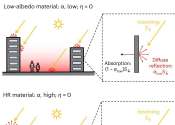Retro-reflectors could help future cities keep their cool
Engineers at Princeton University have quantified the cooling benefits of a simple solution for beating urban heat: reflecting solar radiation back from whence it came.
Apr 17, 2024
0
50
Engineering

Engineers at Princeton University have quantified the cooling benefits of a simple solution for beating urban heat: reflecting solar radiation back from whence it came.
Apr 17, 2024
0
50
Engineering

Most people do not give the U.S. electric grid a second thought—we flip a switch, and the lights come on. Behind the scenes are thousands of power plants and utilities linked by millions of miles of transmission lines. ...
Apr 16, 2024
0
57
In physics and thermodynamics, heat is the process of energy transfer from one body or system to another due to a difference in temperature. In thermodynamics, the quantity TdS is used as a representative measure of the (inexact) heat differential δQ, which is the absolute temperature of an object multiplied by the differential quantity of a system's entropy measured at the boundary of the object.
A related term is thermal energy, loosely defined as the energy of a body that increases with its temperature. Heat is also loosely referred to as thermal energy, although many definitions require this thermal energy to actually be in the process of movement between one body and another to be technically called heat (otherwise, many sources prefer to continue to refer to the static quantity as "thermal energy"). Heat is also known as "Energy".
Energy transfer by heat can occur between objects by radiation, conduction and convection. Temperature is used as a measure of the internal energy or enthalpy, that is the level of elementary motion giving rise to heat transfer. Energy can only be transferred by heat between objects - or areas within an object - with different temperatures (as given by the zeroth law of thermodynamics). This transfer happens spontaneously only in the direction of the colder body (as per the second law of thermodynamics). The transfer of energy by heat from one object to another object with an equal or higher temperature can happen only with the aid of a heat pump, which does work.
This text uses material from Wikipedia, licensed under CC BY-SA